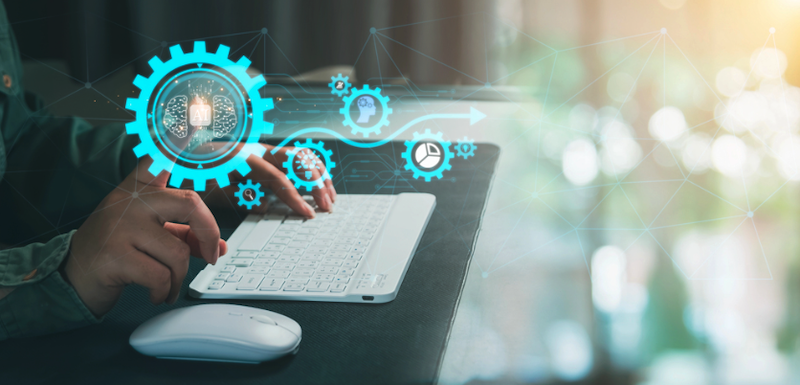It’s harder to avoid AI in marketing than to integrate it into your campaign – and there’s no need to shy away from it!
In fact, embracing AI and delegating part of your workload to it can give you a competitive edge.
With the right approach, AI can significantly boost your marketing efficiency, reduce costs, and improve results.
But first, you need to understand what AI can realistically do and how it fits into your broader marketing strategy.
This article is your starting point. Below, you’ll find the key benefits of using AI in marketing – and how it can directly impact your bottom line.
Enhancing digital marketing campaigns with AI
1. Content generation and curation
Content creation remains the backbone of digital marketing, designed to inform, engage, and drive action.
In this context, the role of AI in marketing is impossible to overstate, as it supports a wide range of tasks.
For example, you can generate AI images using tools like VistaCreate and combine them with product photos to create more compelling and visually dynamic content.
Alternatively, AI-powered writing tools with natural language generation capabilities can draft SEO articles, product descriptions, and marketing emails, helping you maintain consistency in tone and messaging while saving time on ideation and execution.
Curation engines, on the other hand, automatically select and recommend relevant articles, videos, and social content tailored to specific target audiences.
This helps you, as a digital marketing specialist using AI-enhanced tools, prepare material that aligns with people’s interests and their stage in the funnel.
The result is more meaningful engagement, longer session durations, and improved platform stickiness – key metrics in any digital campaign.
2. Optimized ad campaigns and programmatic advertising
AI used in digital marketing also enables real-time bidding (RTB), leveraging sophisticated algorithms to optimize audience targeting. This reduces wasted ad spend and allows you to focus your budget on the most impactful ad sets, maximizing ROI with strategic precision.
AI also facilitates A/B/C testing, allowing you to reallocate resources mid-campaign to support top-performing creatives. This kind of adaptive budgeting boosts performance without overspending.
AI-driven engines are extremely valuable in digital marketing. They dynamically adjust banners, email content, and display ads based on a user’s behavior, device, location, and interaction history.
Real-time customization increases conversion rates and enhances user satisfaction by delivering content that is both tailored and timely. In the long run, AI-based dynamic ad targeting can drive stronger revenue growth.
Strengthening marketing strategy and decision-making with AI
1. Predictive analytics and insights generation
Forecasting customer behavior and market volatility was once a complex task, requiring extensive data collection and expert analysis.
Today, using AI in marketing dramatically simplifies this process, identifying trends and projecting future outcomes with impressive accuracy. In many cases, a single professional is now enough to validate insights and take action.
AI models can forecast customer churn, predict purchase intent, and estimate lifetime value, making it easier to design proactive retention strategies and personalized campaigns.
AI also uncovers non-obvious patterns and correlations that might be missed in manual reviews. It continuously monitors performance across channels and campaigns, capturing micro-trends early and enabling brands to pivot strategies before opportunities slip away.
AI-powered dashboards translate these insights into digestible visual formats – equipping decision-makers with actionable intelligence, not just raw numbers.
2. Task optimization and workflow automation
Undoubtedly, tasks like email scheduling, lead scoring, data entry, and campaign reporting are essential in digital marketing. But there’s a catch – they’re time-consuming. Fortunately, blending digital marketing with artificial intelligence is proving invaluable.
AI-powered platforms can manage social media posting schedules, score leads based on real-time engagement, generate reports, and even handle basic customer interactions through chatbots.
The result? Greater bandwidth and higher job satisfaction for AI-powered marketing teams. According to CoSchedule’s 2025 report, marketers who leverage modern automation technologies save an average of over five hours per week.
This reclaimed time can then be redirected to strategic planning, creative development, and performance analysis – areas where human expertise remains irreplaceable.
Powering full-funnel, AI-driven marketing
1. Dynamic pricing and offer adjustment
Many AI tools for digital marketing can empower you to adjust pricing and promotional offers in real time. They typically take into account factors such as:
- fluctuations in supply and demand;
- competitor activity; and
- customer data.
Dynamic pricing models use these factors to fine-tune prices for specific user segments or even individual users. Depending on the business goals, they can optimize for profit, conversions, or customer retention.
For retailers, utilizing AI-powered pricing engines has boosted profits by capitalizing on high-demand periods and reducing excess inventory more efficiently.
Additionally, AI can trigger hyper-targeted discounts during cart abandonment or recommend product bundles designed to increase average order value.
2. Enhanced customer journey orchestration
Mapping and refining the customer journey are other areas where AI plays a decisive role. It analyzes behavioral signals and historical data to determine the next-best action – whether that’s a retargeting ad, a time-sensitive email, or a chatbot prompt guiding the user toward conversion.
This use case of artificial intelligence in marketing enables the seamless orchestration of fragmented touchpoints into a unified customer experience.
As a result, it significantly boosts customer satisfaction and lifetime value. Collaborative efforts between AI systems and human marketers have demonstrated up to 60% gains in productivity and overall campaign effectiveness.
Marketing teams leveraging AI-assisted journey mapping report faster funnel progression and reduced drop-off rates across all channels.
Conclusion
AI is becoming a cornerstone in marketing, building, testing, and improving campaigns. When used wisely, it helps you work smarter, not harder, by automating repetitive tasks, uncovering insights faster, and personalizing content to better resonate with your audience.
The primary strategic advantage is that AI-powered tools boost results without draining resources, whether you’re running lean campaigns or managing large-scale strategies.
Just remember: the key is to approach the technology not as a replacement, but as a powerful support system that helps you improve.



